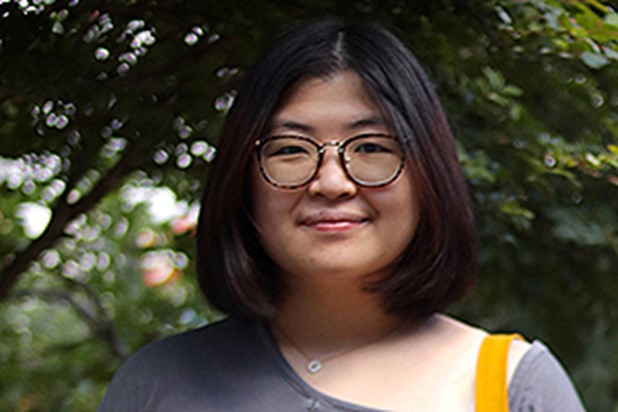This blog is in celebration of Asian American and Pacific Islander Heritage Month. Read this blog in Indonesian. Tersedia dalam Bahasa Indonesia.
 Cindy Angela is the digital communication associate for Mosaic Mennonite Conference. She is originally from Surabaya, Indonesia. She currently lives in Philadelphia, Pennsylvania, with her husband, Andy, and attends Philadelphia Praise Center. She is presently pursuing her M.A. in transformational leadership at Eastern Mennonite University.
Cindy Angela is the digital communication associate for Mosaic Mennonite Conference. She is originally from Surabaya, Indonesia. She currently lives in Philadelphia, Pennsylvania, with her husband, Andy, and attends Philadelphia Praise Center. She is presently pursuing her M.A. in transformational leadership at Eastern Mennonite University.
______________________________
When I moved from Surabaya, Indonesia, to Philadelphia, Pennsylvania, I was worried that I would become out of touch with my Indonesian culture. However, I was delighted by the richness of the Indonesian community in Philadelphia. I had no issues finding Indonesian pantry ingredients, Indonesian restaurants and even an Indonesian congregation.
I always knew that I wanted to be a part of a community, and I was looking for a church that I could grow and thrive in. Philadelphia Praise Center (PPC) was the first congregation that I attended after arriving in Philadelphia, and I have been there for almost a decade. Through this church, I was introduced to the idea of being a Mennonite and to Anabaptist values. I was baptized in the church’s basement in 2016.
PPC is one of the many Indonesian congregations in Mosaic Conference (formerly a part of Franconia Conference, before their merger with Eastern District in 2020). Outside of PPC, there are two other Indonesian congregations in South Philadelphia, as well as others in New York and California. It was only after I started working for Mosaic Conference that I realized that there are Mennonites in Indonesia, and I’m elated that the Mennonite World Conference Assembly in 2022 will be in Semarang, Indonesia.
Although I was transformed and changed after my decision of following Christ, I never felt like I needed to shed my Indonesian culture or completely reinvent my identity. But rather, I feel welcome to carry my history, background and culture along with me on my journey with Christ. And now, I would like to share some things that I treasure from the Indonesian culture that I still carry with me every day.
“Bhinekka Tunggal Ika”
“Bhinekka Tunggal Ika” is Indonesia’s motto. It meant “unity in diversity” in the Kawi language.
People who are not familiar with Indonesian culture are surprised when I tell them: “My husband and I are both from Indonesia, but I can speak a totally different language that he wouldn’t understand.”
While Bahasa Indonesia is the national language of Indonesia, there are over 300 native languages in Indonesia. There are many people in the country that can speak a second, or even third, language. I was born and raised in Surabaya in East Java, which means I got to learn Bahasa Jawa (Javanese), when I was growing up.
More than language, we can see the multifaceted parts of Indonesia reflected through cuisines, customs, traditions or even “batik” from different regions and ethnic groups. And these differences are seen as beautiful. These differences are what unites us. I was reminded of the passage from Romans that spoke similarly about this:
“For as in one body we have many members, and the members do not all have the same function, so we, though many, are one body in Christ, and individually members one of another.” (Romans 12:4-5, ESV)
“Gotong Royong”
Indonesia has a very communal culture, from the way we make decisions to the way we do things. In Bahasa Indonesia, there’s a term, “gotong royong,” that is frequently used. The word “gotong” means “to carry” and “royong” means “together/with many people.”
“Bear one another’s burdens, and so fulfill the law of Christ.” (Galatians 6:2, ESV)
“Gotong royong” teaches me that we need to help each other to survive, and I think of it as a great way to show Christ’s love to others around us.
“Buah Tangan”
Ever since I was a little girl, my mom taught me to never come empty handed. In Indonesia culture, whenever we visit someone, we always bring something, which we call “oleh-oleh,” translated “small gifts,” or “buah tangan,” translated “the fruit of the hand.”
It can be a kitchen magnet, or it can be a food item. “Oleh-oleh”/“buah tangan” shows that you remembered someone, and you wanted to share a little bit of your experience with them.
Just like the fruit of the Spirit, we can instill love, joy, peace and kindness in others through the “fruit” of our hands.
These practices have been a part of the Indonesian culture for a long time, and I am grateful for this opportunity to share some pieces from back home. It was no coincidence that this world’s woven together by so many different cultures and languages, and I am looking forward to how God will continue to transform and unite us through our differences.
The views and opinions expressed in this blog belong to the author and are not intended to represent the views of the MC USA Executive Board or staff.

